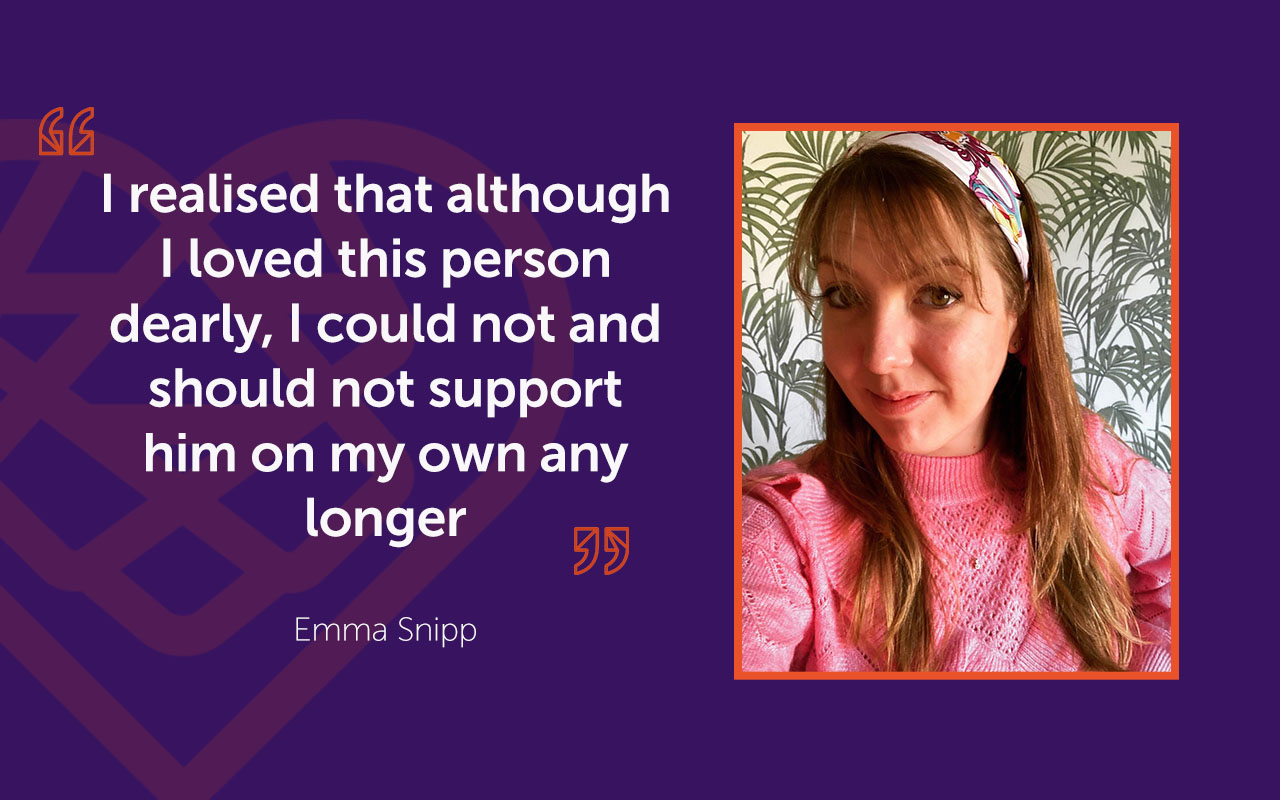Asking for help - as the helper

I vividly remember sitting at my desk, trying to write an email, and struggling to concentrate; it wasn't even midday and all I could think about was what I was going home to.
My partner was struggling with his mental health.
He was regularly taking days off sick from work, after confessing to me that he was having thoughts of ending his life. But he felt so strongly that 'real men didn't get emotional', I was forbidden to tell anyone about his struggles.
He'd storm off and disappear, or would lock himself in the bedroom for days. He wouldn't eat, he only slept in the daytime, he didn't wash or shave. He wouldn't go to the doctor or tell his work or family: it was our secret.
It was heart-breaking to watch someone I cared for so deeply slip into such a dark place. He also got increasingly angry and aggressive, would regularly punch walls, break things, and tell me how awful we both were as people.
If you live with someone who is suffering with depression and struggling with suicidal thoughts, you may well find that you are regularly confronted with some of that hatred and ugliness. It can be hard to appreciate that it isn't really them - it's the depression talking. Depression can make the people you love (and who love you) treat you poorly, carelessly or, on occasion, quite cruelly.
I couldn't, and shouldn't, support him on my own
I would often agonise over how I could take the pain away, how I might keep him safe, what I could do differently, which parts of this were my fault.
And the truth of the matter was, when he was suffering the most, I was actually frightened: frightened of what he would do to himself, but also of what he might do to me.
On days like this, he would tell me he didn't want to be here anymore and sometimes he would say I was part of the problem. He would insist I go to work so he could just be on his own, make me promise I wouldn't tell anyone, and then he'd turn off his phone for hours and sleep - leaving me imagining the worst.
Sitting at my desk, struggling to think, and seeing my work get further and further behind, I realised that although I loved this person dearly, I could not and should not support him on my own any longer.
I finally saw that there was no failure in admitting that I could not keep my partner safe without support and, if I was honest, my own mental health was suffering from the strain of trying to handle it all alone.
Putting your own mask on first
Reaching out allowed me to see that I was not helping my partner by supporting his beliefs around the stigma of men and mental health. I was being complicit, and it was hurting us both. Much like when the air steward reminds you to put your own mask on first, I could not help him recover his health and happiness without prioritising my own.
I later learnt it's not uncommon for people with depression to lash out at those with whom they feel safest, and though this doesn't make it ok, it did help me come to terms with what I was seeing and hearing. It gave me the strength to put healthy boundaries in place, and not accept cruel behaviour against either me or himself - boundaries that were necessary for both of our recovery, self-respect and ultimately our relationship.
Eventually, we got the help we needed. Over many months and time off work, through a mixture of openness, love, support, medication, and counselling, he regained his health and his happiness.
Months later, he apologised and said he knew he had treated me badly. He wanted me to know that he was always grateful for supporting him, but that he respected me for not letting myself be pulled into the same cloud - if I hadn't got the help I needed to help him, we might both have drowned.
The rippling impact of a loved one's mental health
Fast forward a few years, and though I am no longer with this partner, I always credit this experience with opening my eyes towards the substantial rippling impact created in families from a loved one suffering with poor mental health. After 15 years in the property industry, I left asset management to start my own practice as a confidence and resilience coach, and joined LionHeart as a volunteer ambassador, so that I might continue to support people like my ex-partner and myself during their difficult journeys.
If you find yourself helping someone you love through their mental health journey, please take the time to stop and consider what putting on your own mask looks like. Organisations like LionHeart have the resources and knowledge to support you wherever you are.
Please know, you never have to shoulder anything on your own.
Emma Snipp spent 15 years working in the property industry, specialising in commercial asset management. She is now a confidence & resilience coach, mentor and public speaker based in London, and volunteers as an ambassador for LionHeart.

